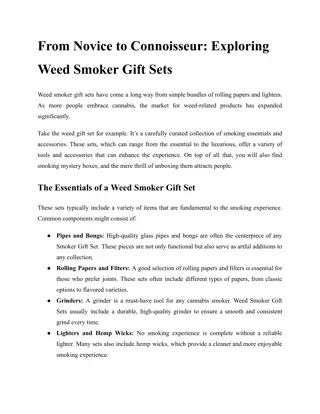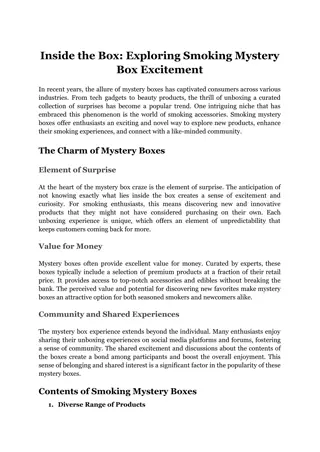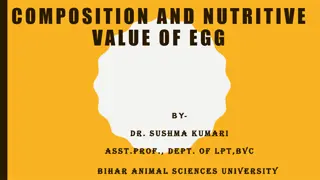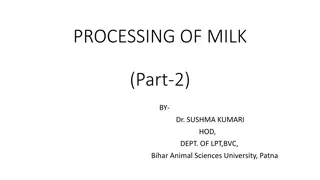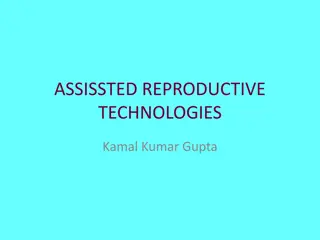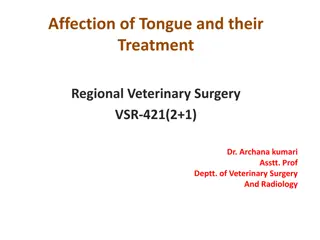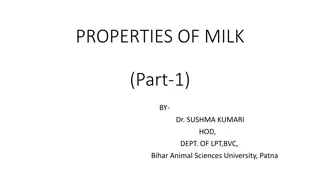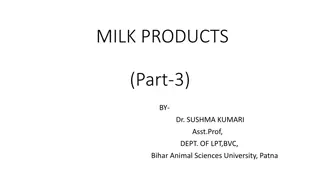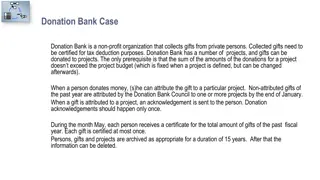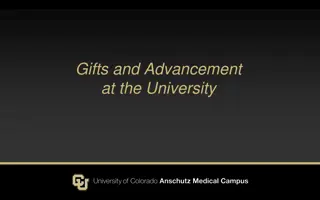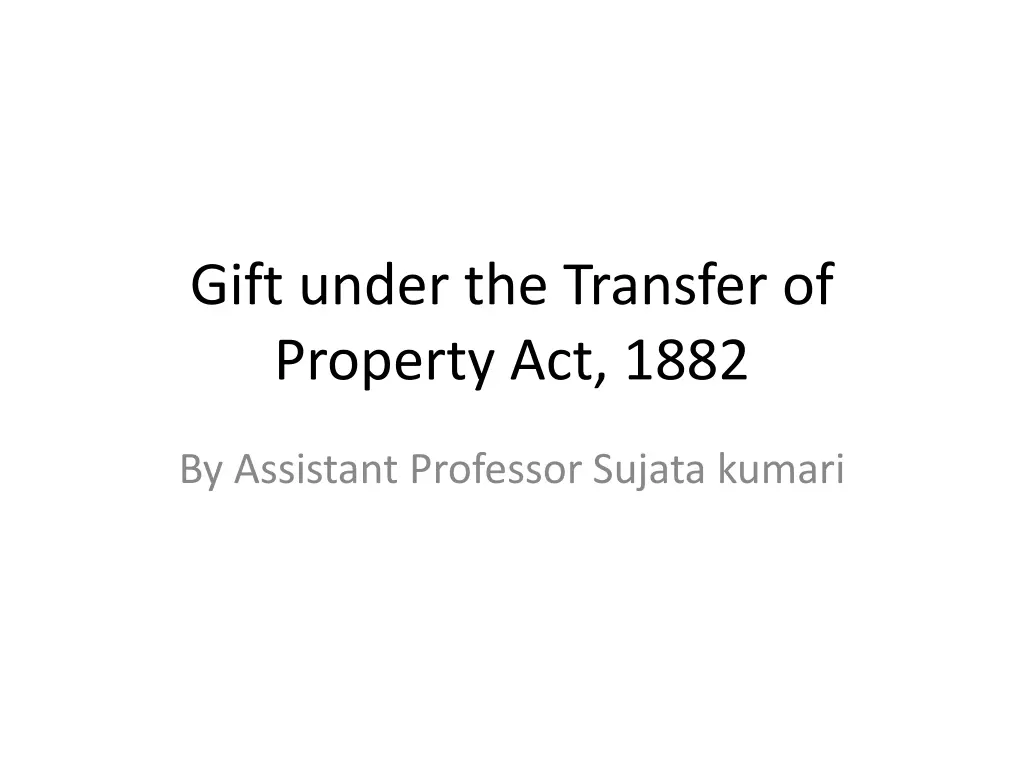
Understanding Gift under the Transfer of Property Act 1882
Explore the concept of gift under the Transfer of Property Act, 1882 by Assistant Professor Sujata Kumari. Learn about the legal provisions, meaning, definition, essential elements, and requirements for a valid gift. Discover the importance of transfer of ownership, existing property, voluntary transfer, and more in the realm of gifting property in India.
Download Presentation

Please find below an Image/Link to download the presentation.
The content on the website is provided AS IS for your information and personal use only. It may not be sold, licensed, or shared on other websites without obtaining consent from the author. If you encounter any issues during the download, it is possible that the publisher has removed the file from their server.
You are allowed to download the files provided on this website for personal or commercial use, subject to the condition that they are used lawfully. All files are the property of their respective owners.
The content on the website is provided AS IS for your information and personal use only. It may not be sold, licensed, or shared on other websites without obtaining consent from the author.
E N D
Presentation Transcript
Gift under the Transfer of Property Act, 1882 By Assistant Professor Sujata kumari
Introduction A 'gift' under Indian law refers to a voluntary transfer of property without any monetary consideration. Chapter VII of the Transfer of Property Act, 1882 governs the legal provisions related to gifts, which can involve both movable and immovable properties.
Meaning of Gift According to Section 122 of the Transfer of Property Act, a gift is the voluntary transfer of existing movable or immovable property from one person (donor) to another (donee) without any consideration. The acceptance of the gift by the donee is essential to complete the transaction.
Definition of Gift Section 122 defines Gift Gift is the transfer of certain existing moveable or immoveable property made voluntarily and without consideration, by one person, called the donor, to another, called the donee, and accepted by or on behalf of the donee.
Essential Elements of a Valid Gift Transfer of ownership. Existing property. Voluntry transfer. without consideration. Acceptance By donee.
Transfer of Ownership A valid gift requires the complete transfer of ownership from the donor to the donee. The donor should relinquish all rights in the property, and the donee should acquire absolute ownership.
Existing Property Only existing property can be gifted under Section 124. Future property, which the donor does not own at the time of the gift, cannot be legally transferred as a gift. Both movable and immovable property may be gifted.
Voluntary Transfer The donor must make the gift out of their free will. If the gift is made under coercion, fraud, or undue influence, it is not considered valid under law.
Without Consideration A gift must be gratuitous, i.e., made without expecting any payment or compensation. The absence of consideration distinguishes a gift from a sale or exchange.
Section 123 - Transfer How Effected According to Section 123, the transfer of immovable property must be executed by a registered instrument signed by the donor and attested by at least two witnesses. For movable property, the transfer can be made either by delivery of possession or through a registered document.
Section 124 - Gift of Existing and Future Property Section 124 states that a gift comprising both existing and future property is valid only to the extent of the existing property. The part concerning future property is void.
Section 125 - Gift to Several Donees If a gift is made to multiple donees and one or more of them does not accept it, the gift is valid only for those who have accepted. The share of the non-accepting donee lapses.
Section 126 - When Gift May Be Suspended or Revoked A gift can be revoked under two circumstances: if it is subject to a condition agreed upon by both parties, and that condition is not fulfilled; or if it is obtained through coercion, fraud, or undue influence.
Section 127 - Onerous Gift An onerous gift is one that comes with a burden or liability. The donee has the choice to accept or reject such a gift. If the donee is a minor, they may repudiate the gift upon attaining majority.
Section 128 - Universal Donee A universal donee is someone who receives all the property and liabilities of the donor. As per Section 128, the universal donee is responsible for all debts and obligations attached to the property.
Section 129 - Saving of Donations Mortis Causa and Muslim Law Section 129 clarifies that the provisions of this chapter do not affect gifts made under Muslim law (Hiba) or gifts of movable property made in contemplation of death (donatio mortis causa).
Comparison - Gift vs Hiba (Muslim Law) Under the Transfer of Property Act, a gift requires registration (for immovable property) and acceptance. In contrast, Hiba under Muslim law can be oral and does not require registration. A valid Hiba requires declaration, acceptance, and delivery of possession.
Gift vs Will A gift takes effect immediately upon acceptance by the donee, whereas a will only becomes operative after the death of the testator. This distinction is vital in determining the timing and enforceability of the transfer.
Gift vs Sale A gift is a voluntary transfer without any monetary consideration, while a sale involves payment of a price in exchange for the property.
Gift vs Exchange A gift is a one-way transfer without return, whereas an exchange involves mutual transfers where both parties give and receive something of value. The obligations under both transactions also vary.
Landmark Case - K. Balakrishnan vs K. Kamalam This case emphasized the importance of acceptance by the donee. The court held that a gift deed is not valid unless it is accepted by the donee during the lifetime of the donor.
Landmark Case - Naramadaben Maganlal Thakker vs Pranjivandas Maganlal Thakker The court ruled that conditions attached to a gift must be lawful. If the condition is unlawful or immoral, the gift may become void.
Landmark Case - Renikuntla Rajamma vs K. Sarwanamma This case upheld the validity of an oral gift of movable property. The court observed that delivery of possession and donor s intention are key to the validity of such a gift.
Gift to Minor A minor can be a donee through their legal guardian. The guardian must accept the gift on behalf of the minor. Upon attaining majority, the donee may choose to accept or repudiate the gift.
Conditional Gifts Gifts can be conditional, but the conditions must be legal and not against public policy. If a condition fails, the gift may become void or may be revoked.
Registration of Gift Deed For immovable properties, registration of the gift deed is mandatory under the Indian Registration Act, 1908. It must be signed by the donor and attested by two witnesses.
Conclusion Gifts are legally binding transfers that require compliance with the provisions of the Transfer of Property Act, particularly Sections 122 to 129. Legal formalities such as acceptance, registration, and documentation are crucial to ensure validity.
Thank You / Q&A We hope this presentation provided a clear understanding of gifts under Indian law. Please feel free to ask any questions or seek clarifications.




